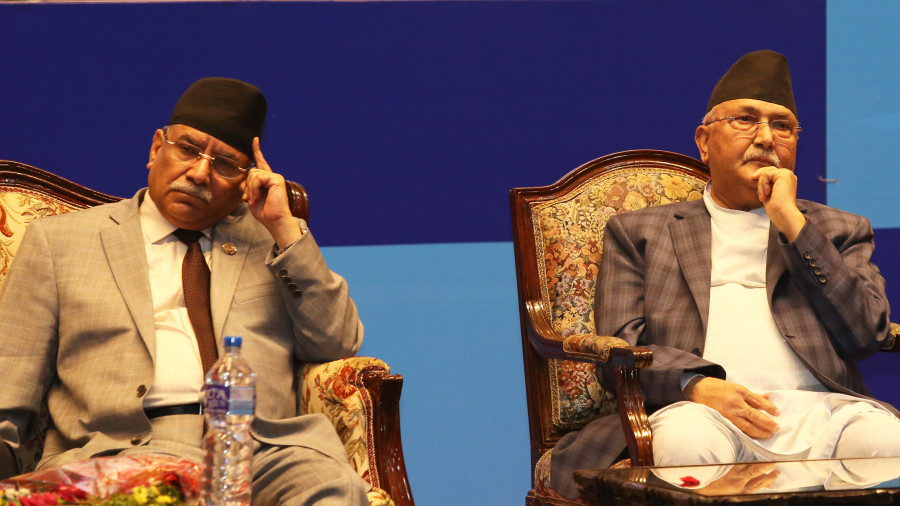Politics
Oli and Dahal attempt to make amends to avoid looking like each side is taking advantage of a crisis
Although internal divisions remain, both factions of the ruling party seek a compromise, but not many are optimistic.
Tika R Pradhan
The Covid-19 crisis could have been an opportunity for the ruling Nepal Communist Party to present a united front, but the pandemic has become a catalyst instead for allegations and counter-allegations between rival factions. The party appears sharply divided between the two camps led by chairs KP Sharma Oli, who is also the prime minister, and Pushpa Kamal Dahal. But each side is making slight overtures in order to avoid looking like it is taking advantage of a crisis.
The last time the two chairs had a face-to-face interaction was on April 8, during a Secretariat meeting. The conversation, however, was not cordial, said party insiders, as mistrust was palpable.
Oli, who has been under pressure following criticism over his government’s poor handling of the Covid-19 pandemic and alleged corruption by his ministers, has long seen Dahal as an adversary scheming to unseat him. Dahal, who has managed to strengthen his grip on the party over the last few months, was in a comfortable position to attack Oli, albeit obliquely, by bringing up issues related to governance. Oli was also unhappy with Dahal’s recent proposal to form an all-party mechanism to assist the government in the fight against the coronavirus.
After this meeting over 10 days ago, Dahal and Oli met on Saturday for hours at Baluwatar, discussing a wide range of issues.
While Oli was fighting criticism, Dahal was biding his time, strengthening his faction and even doing interviews.
“With the crisis deepening and the government under fire, Oli seems to have realised that he cannot move without taking Dahal along,” said Devendra Poudel, a standing committee member.
According to leaders, after Oli outright rejected Dahal’s proposal to form the all-party mechanism, the latter was waiting for a meeting to clear the air. But Oli was reluctant.
A sudden rise in the number of Covid-19 cases, with the tally reaching 30 on Friday, meant that the Oli government came under more pressure.
The Oli government appeared to realise that there was no other way except to narrow down the differences to fight growing criticism, according to a party leader.
Factional feuds that were earlier confined to party offices and leaders’ residences slowly started to spill out onto social media. The former Maoists appeared a little too vocal in criticising the Oli government.
The Oli camp was not amused.
“At a time when we need to build a unified front, the government is under attack from former factions in the party,” Shankar Pokhrel, the Province 5 chief minister who is also a standing committee member, wrote on Facebook on Sunday.
Pokhrel who represents the former CPN-UML in the Nepal Communist Party (NCP) is considered close to Oli.
According to insiders, the Dahal camp has also realised that hostility was growing and that it was not going to do any good to the party.
In an interview with Kantipur, the Post’s sister paper, published on Sunday, Dahal appeared softer, holding himself back from going all-out against the government and its efforts to deal with Covid-19.
He told Kantipur that his call for an all-party mechanism was misconstrued as a bid to take advantage of the crisis.
“That was just a suggestion; not pressure. Many people thought I wanted such a mechanism under my leadership,” Dahal told Kantipur. “I am very clear that if such a mechanism is formed, it has to be under the prime minister. I have already said that if the prime minister has an objection, that’s fine. Not a big deal for me.”
Even Oli’s aides, although they refused to provide specifics about the meeting between the two leaders, described it as a positive development, given recent events that sent a message of mistrust.
“Saturday’s meeting was cordial and the two leaders have agreed to continue discussions to iron out the differences,” said one of Oli’s advisors on condition of anonymity. “Both leaders also agreed to hold party meetings on a regular basis and continue one-on-one interactions more frequently.”
But not all in the party, especially those representing the former Maoist party, are too optimistic.
“It’s not enough to say things are going in the right direction just going by a meeting or two between the two leaders,” said Yubaraj Chaulagain, a central committee member. “The leaders should make genuine efforts to consolidate the party for effective governance instead of using each other for personal gains. This won’t help the party.”




 14.24°C Kathmandu
14.24°C Kathmandu














